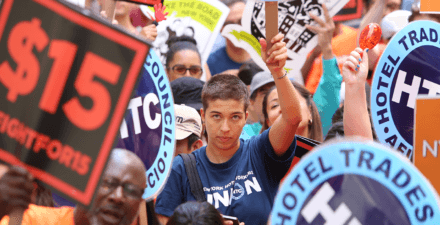Brad DeLong: Worthy reads on equitable growth, October 5–11, 2019
Worthy reads from Equitable Growth:
- This is very, very, very much worth watching: “Research on Tap: Unbound,” in which “Equitable Growth celebrated the release of Heather Boushey’s book, Unbound: How Inequality Constricts Our Economy and What We Can Do About It. She was joined by Sandra Black, Atif Mian, and Angela Hanks for a conversation moderated by Binyamin Appelbaum.”
- And this upcoming event will be well worth attending, “Vision 2020: Evidence for a Stronger Economy”: “Vision 2020 will bring together leading voices from the policymaking, academic, and advocacy communities to highlight the most pressing economic issues facing Americans today. This daylong conference will explore recent transformative shifts in economic thinking that demonstrate how inequality obstructs, subverts, and distorts broadly shared economic growth and what we can do to fix it.”
- I would have thought wealth taxation would be the default conventional neoliberal public finance position. You want to broaden the base and lower the rates. And what base is broader than wealth? Administrative, behavioral-response, and information-revelation considerations can move you away from a wealth tax to narrower bases. But it has always seemed to me that a wealth tax is where you start. That does not seem to be how the public finance intellectual community is reacting. We, however, are providing pushback. Read Fatih Guvenen, Gueorgui Kambourov, Burhan Kuruscu, Sergio Ocampo, and Daphne Chen, “Use It or Lose It: Efficiency Gains from Wealth Taxation,” in which they write: “How does wealth taxation differ from capital income taxation? When the return on investment is equal across individuals, a well-known result is that the two tax systems are equivalent. Motivated by recent empirical evidence documenting persistent heterogeneity in rates of return across individuals, we revisit this question. With such heterogeneity, the two tax systems have opposite implications for both efficiency and inequality. Under capital income taxation, entrepreneurs who are more productive, and therefore generate more income, pay higher taxes. Under wealth taxation, entrepreneurs who have similar wealth levels pay similar taxes regardless of their productivity, which expands the tax base, shifts the tax burden toward unproductive entrepreneurs, and raises the savings rate of productive ones. This reallocation increases aggregate productivity and output.”
- “My Job as the Economist Here Is to Do the Numbers,” in which I write: “People believe that they have rights to a good life. People believe they have rights to stable communities that support them and that don’t disrupt and overturn their lives … Look at my neighbors … horrified at the idea that they might want to tear down a single-family house and build an apartment building for students. People think that they have the right to the income that corresponds to the profession or the occupation that they have worked hard to become part of … People believe that … their job shouldn’t suddenly vanish because some financier 3,000 miles away decided it doesn’t make a cost-benefit test. Yet the only rights the market respects are property rights, and the only property rights that are worth anything are those that help you make things for which rich people have a serious and unsatiated jones. The fact that the U.S. economy over the past 40 years has not been delivering substantially rising living standards for everybody means that the market’s failure to deliver these other forms of nonproperty rights becomes the source of—call it economic anxiety—a big potential problem.”
Worthy reads not from Equitable Growth:
- Why invite people onto TV just so that they can tell lies? Read Zachary Basu, “Trump trade adviser Peter Navarro: Tariffs aren’t hurting anyone in the U.S.,” in which Basu writes: “White House trade adviser Peter Navarro said on CNN’s ‘State of the Union’ Sunday that tariffs on Chinese goods are not hurting consumers in the United States, despite reports to the contrary from researchers at Harvard, the University of Chicago, the International Monetary Fund, the Federal Reserve of Boston and more.”
- This is absolutely fascinating. The rich in the American South were much poorer a generation after the Civil War than they had been before: Sharecropping and Jim Crow were less effective at extracting wealth from African Americans. But Phil Ager and company find no signs that those fractions of the elite who were direct slaveholders lost more than those members of the elite who were indirect slaveholders. I am going to have to think very hard about this. Read Philipp Ager, Leah Platt Boustan, and Katherine Eriksson, “The Intergenerational Effects of a Large Wealth Shock: White Southerners After the Civil War,” in which they write: “The nullification of slave-based wealth after the U.S. Civil War (1861–65) was one of the largest episodes of wealth compression in history. We document that white southern households with more slave assets lost substantially more wealth by 1870 relative to households with otherwise similar pre-War wealth levels. Yet, the sons of these slaveholders recovered in income and wealth proxies by 1880, in part by shifting into white collar positions and marrying into higher status families. Their pattern of recovery is most consistent with the importance of social networks in facilitating employment opportunities and access to credit.”
- The best thing I have yet seen on how industrial organization, concentration, and monopsony drive the conclusion that increases in the minimum wage do not reduce employment in the United States today—or, rather, for which groups of workers minimum wage increases lower and for which raise employment. Read José Azar, Emiliano Huet-Vaughn, Ioana Marinescu, Bledi Taska, and Till von Wachter, “Minimum Wage Employment Effects and Labor Market Concentration,” in which they write: “Why is the employment effect of the minimum wage frequently found to be close to zero? Theory tells us that when wages are below marginal productivity, as with monopsony, employers are able to increase wages without laying off workers, but systematic evidence directly supporting this explanation is lacking. In this paper, we provide empirical support for the monopsony explanation by studying a key low-wage retail sector and using data on labor market concentration that covers the entirety of the United States with fine spatial variation at the occupation-level. We find that more concentrated labor markets—where wages are more likely to be below marginal productivity—experience significantly more positive employment effects from the minimum wage. While increases in the minimum wage are found to significantly decrease employment of workers in low concentration markets, minimum wage-induced employment changes become less negative as labor concentration increases, and are even estimated to be positive in the most highly concentrated markets. Our findings provide direct empirical evidence supporting the monopsony model as an explanation for the near-zero minimum wage employment effect documented in prior work. They suggest the aggregate minimum wage employment effects estimated thus far in the literature may mask heterogeneity across different levels of labor market concentration.”
- It is now very, very clear that whatever Facebook says about how it strives to keep your data private, it is lying. Organizations are what they do: Facebook is an organization that makes money out of offering people data they can then use to try to hack your brain. Read Kate Conger, Gabriel J.X. Dance, and Mike Isaac, “Facebook’s Suspension of ‘Tens of Thousands’ of Apps Reveals Wider Privacy Issues,” in which they write: “Facebook said on Friday that it had suspended tens of thousands of apps for improperly sucking up users’ personal information and other transgressions, a tacit admission that the scale of its data privacy issues was far larger than it had previously acknowledged. The social network said in a blog post that an investigation it began in March 2018—following revelations that Cambridge Analytica, a British consultancy, had retrieved and used people’s Facebook information without their permission—had resulted in the suspension of ‘tens of thousands’ of apps that were associated with about 400 developers. That was far bigger than the last number that Facebook had disclosed of 400 app suspensions in August 2018 … Facebook … suspended 69,000 apps. Of those, the majority were terminated because the developers did not cooperate with Facebook’s investigation; 10,000 were flagged for potentially misappropriating personal data from Facebook users. The disclosures about app suspensions renew questions about whether people’s personal information on Facebook is secure, even after the company has been under fire for more than a year for its privacy practices.”
- My colleague Christy Romer is giving the Keynes lecture at the University of Cambridge on October 17, on “The Narrative Approach to Establishing Causation in Macroeconomics.”






